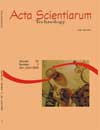<b>Evaluation of the performance of public schools through Data Envelopment Analysis</b> - DOI: 10.4025/actascitechnol.v31i1.1547
DOI:
https://doi.org/10.4025/actascitechnol.v31i1.1547Keywords:
Data Envelopment Analysis, correlação canônica, educaçãoAbstract
This work intends to analyze the performance of the primary and secondary schools comprising the Regional Education Center from Paranavaí-Pr. The evaluation will be carried out employing DEA (Data Envelopment Analysis). The variables, which were classified into two groups (input and output), were extracted from surveys applied directly in the schools and from data recorded in the website Dia a dia da educação. Initially, the degree of relation between both variable groups was measured, showing that, on average, the inputs are able to explain approximately 37% of the results in primary education schools and 51% of the results in secondary education schools (output). After calculating the efficiencies considering the CCR DEA method, the outcome is that approximately 55% of the schools are functioning effectively, with an average score of 0.965. The results are indication of possible flaws related to management, and they aid school principals in their decision-making, as well as the government in allocating resources and effort so that inefficient schools perform with effectivenessDownloads
Download data is not yet available.
Downloads
Published
2009-04-14
How to Cite
Barbosa, S. G., & Wilhelm, V. E. (2009). <b>Evaluation of the performance of public schools through Data Envelopment Analysis</b> - DOI: 10.4025/actascitechnol.v31i1.1547. Acta Scientiarum. Technology, 31(1), 71–79. https://doi.org/10.4025/actascitechnol.v31i1.1547
Issue
Section
Statistics
License
DECLARATION OF ORIGINALITY AND COPYRIGHTS
I Declare that current article is original and has not been submitted for publication, in part or in whole, to any other national or international journal.
The copyrights belong exclusively to the authors. Published content is licensed under Creative Commons Attribution 4.0 (CC BY 4.0) guidelines, which allows sharing (copy and distribution of the material in any medium or format) and adaptation (remix, transform, and build upon the material) for any purpose, even commercially, under the terms of attribution.
Read this link for further information on how to use CC BY 4.0 properly.











8.png)




